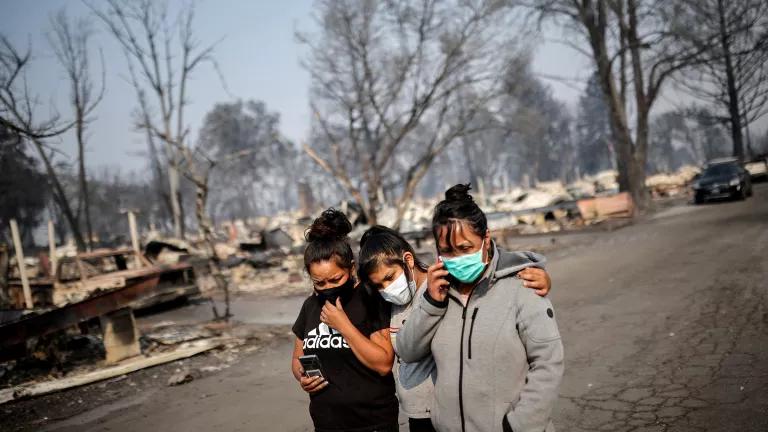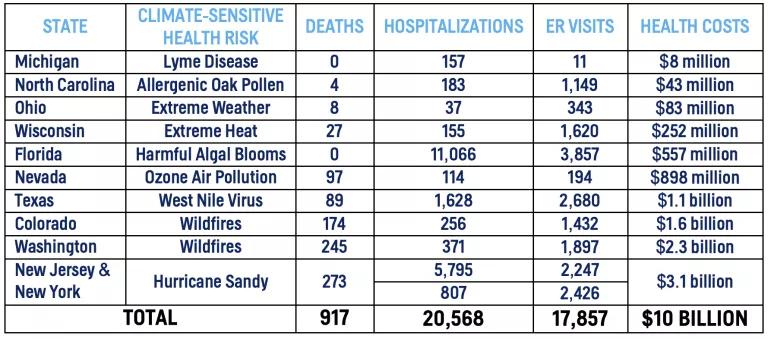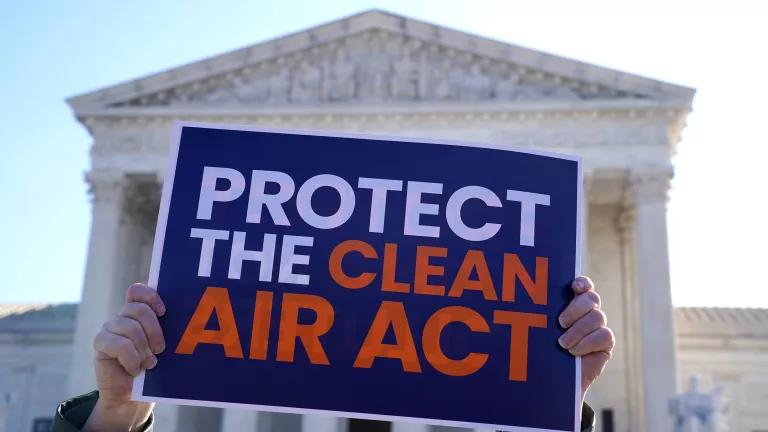The Climate Crisis Is Inflicting Costly Damage to Our Health

We can’t ignore the profound and expensive human suffering triggered by climate change. Watch our video to see why.
It’s been a grueling couple of months in the United States, where stressed communities have been responding to environmental disaster upon disaster while in the grip of the historic COVID-19 pandemic. In the last month alone, more than five million acres of tinder-dry land in the West have been scorched by devastating wildfires across California, Oregon, and Washington that have killed dozens, displaced hundreds of thousands, and choked the air that millions of people breathe with toxic smoke. Meanwhile, in the Southeast, a grim cascade of hurricanes and tropical storms—speeding through the alphabet of named threats in record time—has unleashed flash floods, contaminated drinking water, and triggered power outages for hundreds of thousands of people across Alabama, Florida, Georgia, and Louisiana. And we’re still in the midst of this year’s fire and hurricane seasons.
August 2020 was the third-hottest and third-driest on record in the contiguous United States, and that month also brought searing heat (including temperature readings of 130 degrees Fahrenheit in Death Valley, California). This year is on pace to be the warmest ever recorded by humans.
The climate crisis is here and now, and it’s inflicting terrible damage on public health. Climate-fueled dangers like wildfires, hurricanes, heat waves, certain infectious disease outbreaks, and air pollution episodes are health hazards, and also costly to our economy. They force people from all walks of life—including children, grandparents, first responders, and other outdoor workers—to seek medical care for health problems in hospitals and emergency rooms. Sometimes those physical and mental health problems require hospitalizations, prescription medications, and ongoing outpatient care needs.
All of that medical care comes with a cost—not just to sick individuals, besieged families, and burdened caregivers, but also to businesses, health insurers, and taxpayers who fund critical government insurance programs like Medicare and Medicaid. One way or another, we’re all paying for these costs of climate change. And that gigantic medical bill for ailments brought on by climate chaos is rising as carbon pollution continues to accumulate.
It’s been difficult to track the financial impacts of the health problems linked to climate change, in part due to poor public health data systems and badly underfunded public health departments that work on shoestring budgets to plan for and respond to these events that are growing in geographic scope and severity.
That’s why NRDC experts have been working to shed light on the huge health costs of climate change. One year ago, we published peer-reviewed scientific findings that shed new light on major health costs linked to a set of 10 climate-related case studies that all hit the country in 2012.
That research, analyzing just a sample of climate-fueled disasters from coast to coast, identified more than 900 deaths, 20,000 hospitalizations, and 17,000 emergency room visits. The total bill for those damages to human health? $10 billion.

Limaye, V. S.; Max, W.; Constible, J.; and Knowlton, K. (2019). “Estimating the Health‐Related Costs of 10 Climate‐Sensitive U.S. Events During 2012.” GeoHealth, 3. https://doi.org/10.1029/2019GH000202.
We found that a disproportionate share of those costs, almost two-thirds, was shouldered by Medicare and Medicaid patients, in line with the scientific understanding that the very young, very old, and economically disadvantaged are more likely to suffer from health problems worsened by the climate crisis.
But behind those huge costs and startling statistics are real people and profound suffering. In the video below, we explain the study to highlight the ongoing expense and misery endured by our most vulnerable neighbors as the climate crisis accelerates, and the ways in which new understanding about the health costs of climate change can help to motivate more aggressive policy responses to break our country’s addiction to fossil fuels.
Video transcript available here.
As this video shows, the choices we all make today to better prepare communities for growing climate risks and move our country and our world away from dirty fossil fuels toward clean, renewable, healthy energy sources will help us to improve our health, limit unnecessary suffering, and save billions upon billions of dollars in skyrocketing healthcare spending each year. To limit those costs, slow the march of dangerous disasters in the future, and support those in harm’s way, climate action is more urgent in 2020 than it’s ever been before.



